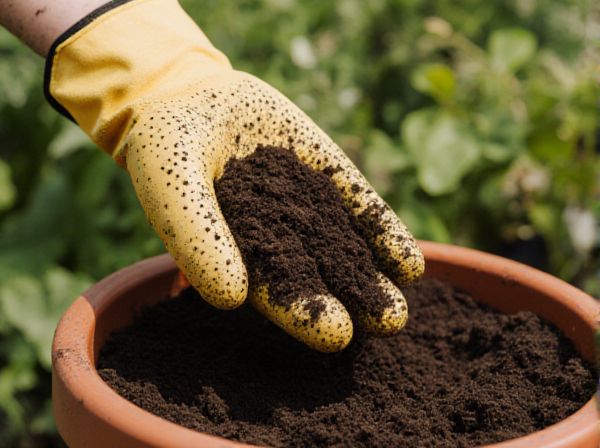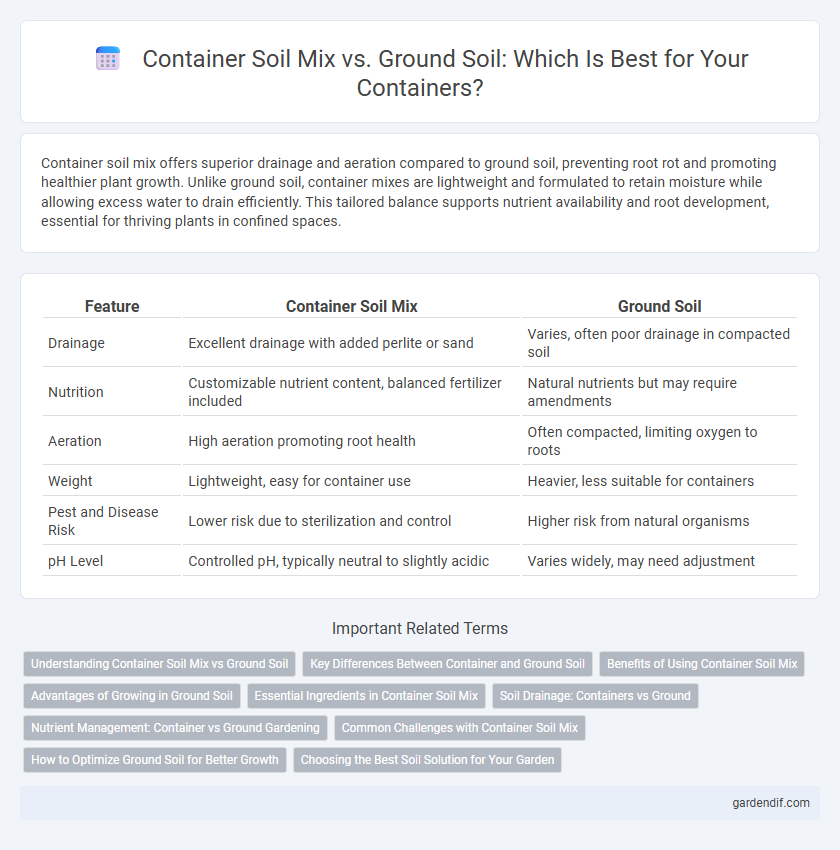
Container soil mix vs ground soil Illustration
Container soil mix offers superior drainage and aeration compared to ground soil, preventing root rot and promoting healthier plant growth. Unlike ground soil, container mixes are lightweight and formulated to retain moisture while allowing excess water to drain efficiently. This tailored balance supports nutrient availability and root development, essential for thriving plants in confined spaces.
Table of Comparison
| Feature | Container Soil Mix | Ground Soil |
|---|---|---|
| Drainage | Excellent drainage with added perlite or sand | Varies, often poor drainage in compacted soil |
| Nutrition | Customizable nutrient content, balanced fertilizer included | Natural nutrients but may require amendments |
| Aeration | High aeration promoting root health | Often compacted, limiting oxygen to roots |
| Weight | Lightweight, easy for container use | Heavier, less suitable for containers |
| Pest and Disease Risk | Lower risk due to sterilization and control | Higher risk from natural organisms |
| pH Level | Controlled pH, typically neutral to slightly acidic | Varies widely, may need adjustment |
Understanding Container Soil Mix vs Ground Soil
Container soil mix differs from ground soil primarily in texture, drainage, and nutrient content, optimized to support plant growth in confined spaces. Ground soil tends to have natural microbial activity and nutrient diversity but often lacks consistent drainage and aeration needed for containers. Understanding these differences helps gardeners select the appropriate medium to prevent root rot, improve aeration, and ensure sufficient nutrient availability for container plants.
Key Differences Between Container and Ground Soil
Container soil mix differs significantly from ground soil in composition, designed for optimal drainage, aeration, and nutrient retention within confined spaces. It typically contains a blend of organic matter like peat moss or coconut coir, perlite or vermiculite for aeration, and controlled-release fertilizers, unlike natural ground soil which varies in texture and nutrient content. These adjustments ensure healthy root growth in containers by preventing waterlogging and promoting oxygen availability, challenges commonly encountered with dense or compacted ground soil.
Benefits of Using Container Soil Mix
Container soil mix offers superior aeration and drainage compared to ground soil, preventing root rot and promoting healthy root development. Its lightweight texture reduces container weight, easing mobility and minimizing compaction risks typical with dense ground soil. Enriched with organic matter and nutrients, container soil mix supports optimal plant growth tailored for confined spaces.
Advantages of Growing in Ground Soil
Growing plants in ground soil offers superior nutrient availability and natural microbial activity compared to container soil mix, promoting healthier root development and stronger plant growth. Ground soil maintains better water retention and aeration, reducing the risk of overwatering or root rot common in container environments. This environment supports larger root systems, enabling plants to access deeper water and nutrients, leading to increased resilience and yield.
Essential Ingredients in Container Soil Mix
Container soil mix requires a balanced combination of organic matter, such as peat moss or coconut coir, for water retention and aeration, combined with perlite or vermiculite to improve drainage and prevent compaction. Essential nutrients like composted bark, slow-release fertilizers, and micronutrients ensure sustained plant growth in confined spaces. Unlike ground soil, container mixes demand a sterile, lightweight composition to promote root health and prevent diseases in restricted root zones.
Soil Drainage: Containers vs Ground
Container soil mix is engineered for superior drainage, often containing perlite, vermiculite, and coarse sand to prevent waterlogging and root rot. Ground soil typically retains more moisture due to its natural composition, which can lead to slower drainage and potential root issues in containers. Optimal drainage in containers is crucial to promote aeration and healthy root growth, a factor less critical in ground soil gardens.
Nutrient Management: Container vs Ground Gardening
Container soil mix offers precise nutrient management by allowing gardeners to customize nutrient levels and pH balance tailored to specific plant needs, unlike ground soil which often requires amendments to correct deficiencies. Container mixes typically include a balanced blend of organic matter, fertilizers, and moisture-retentive components, ensuring consistent nutrient availability. Ground soil nutrient levels can vary widely due to environmental factors and microbial activity, making regular testing and supplementation essential for optimal plant growth.
Common Challenges with Container Soil Mix
Container soil mix often faces drainage and aeration challenges, leading to water retention problems and root rot in plants. Nutrient depletion occurs more rapidly in container soils compared to ground soil, requiring frequent fertilization to maintain plant health. The restricted volume in containers limits root expansion, causing stress and reduced growth compared to plants grown in natural ground soil.
How to Optimize Ground Soil for Better Growth
Enhancing ground soil for optimal plant growth involves incorporating organic matter such as compost or aged manure to improve nutrient content and soil structure. Regular soil testing helps adjust pH levels and nutrient balance, ensuring an ideal environment for root development. Proper aeration and drainage are essential to prevent waterlogging, promoting healthy root respiration and microbial activity.
Choosing the Best Soil Solution for Your Garden
Container soil mix offers superior drainage, aeration, and nutrient retention compared to ground soil, making it ideal for potted plants and urban gardening. Ground soil often contains pests and inconsistent texture, which can hinder root development and plant health. Selecting a high-quality container soil mix tailored to specific plant needs ensures optimal growth and maximizes garden productivity.
Container soil mix vs ground soil Infographic

 gardendif.com
gardendif.com